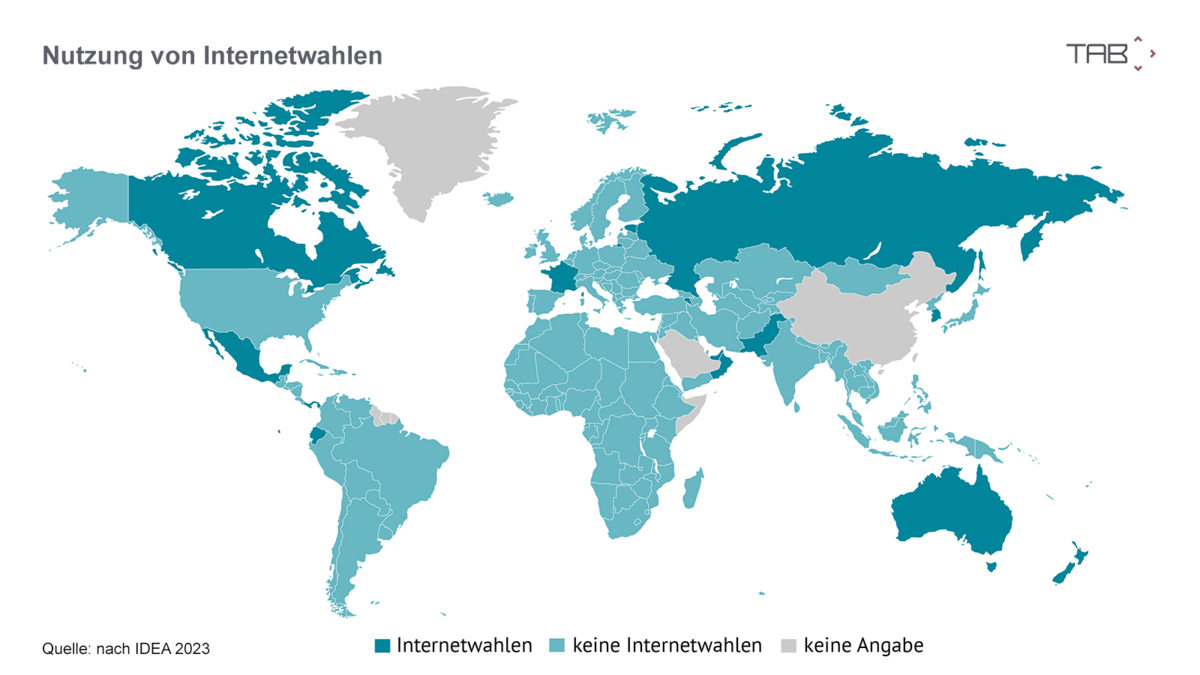
E-voting – alternative forms of voting and how to make them secure
- Project team:
Simone Ehrenberg-Silies (Project Manager), Anne Busch-Heizmann, Jost Lüddecke
- Thematic area:
- Topic initiative:
Committee on Education, Research and Technology Assessment
- Analytical approach:
TA short study
- Startdate:
2021
- Enddate:
2023
The short study prepared by TAB was approved by the Committee for Education, Research and Technology Assessment on 5 July and is currently being prepared for publication.
sprungmarken_marker_1782
Subject and objective of the study
In this study, e-voting is used as a synonym for internet voting, i.e. voting with digital devices from a distance, e.g. from home, i.e. in environments where direct election supervision by election officials is not possible.
The new voting method is associated with various advantages and disadvantages. However, there are no systematic longitudinal studies comparing countries to show whether these can actually be confirmed. This is also due to the fact that there are few practical examples of e-voting on which to base an analysis. Currently, e-voting is used for local, regional and/or national elections in only 14 countries. Only half of them are democracies.
The aim of this short study was to analyse the advantages and disadvantages of e-voting compared to traditional voting methods such as voting in person at a polling station or voting by post. The study was based on three case studies of countries where e-voting systems have been tested or are in continuous use for local, regional, national or European elections - Estonia, Switzerland and Norway. The study was rounded off by an examination of the state of the debate on e-voting in Germany and a scenario-based outlook on the possible further development of Internet voting in Germany.
Key results
Possible advantages of e-voting are discussed mainly in terms of inclusiveness and efficiency, as well as the hope for higher voter turnout. Possible disadvantages relate mainly to technological aspects, such as the comprehensibility of the technologies and procedures used for the general population, and the risk that election results could be falsified or manipulated due to security flaws in the software and hardware used, as well as in the preparation and conduct of Internet elections - to an extent that would simply not be possible with postal and ballot box voting.
The short study shows that the principles of electoral law - universality, freedom, equality, secrecy and publicity of the election - can be fulfilled to varying degrees by the individual voting procedures, depending on the concrete design of the electoral system. In the case of e-voting, the statements are of course only valid under the premise that there is no manipulation.
In principle, the secrecy of the ballot and the freedom to vote are best guaranteed by the use of the ballot box at the polling station. Under certain conditions, the freedom to vote can be better guaranteed in Internet voting than in postal voting. One of these conditions, although not sufficient in itself, is the possibility of updating the vote (the possibility of voting more than once, with only the last vote cast counting).
E-voting is seen as having the potential to facilitate the participation of people with voting intentions who previously had access barriers (e.g. due to mobility impairments or cognitive limitations). This requires that e-voting itself is designed to be accessible. Stakeholders from the social sector, on the other hand, see a risk that the introduction of an e-voting system could result in the accessibility of the other modes of voting not being improved. They also point out that the concept of inclusion cannot be reduced to the act of voting itself. Rather, it is also about tangible participation in a wider social process, which can be better guaranteed by physical, socially experienced presence at the act of voting in a polling station than by voting alone at home via e-voting.
In practice, the results of e-voting have been mixed: While the turnout in university elections at the University of Jena, for example, was significantly increased, the Council of Europe found only a very small positive effect - if any at all - for elections in its member states. The 2023 parliamentary elections in Germany, in which 20 million of the 51 million eligible voters were able to vote online for the first time, also showed no positive effects.
However, the Estonian case study suggests that e-voting could potentially have a stabilising effect on voter turnout, which tends to decline in many democracies.
The drivers and barriers for the introduction of e-voting are closely related to the advantages and disadvantages mentioned above. For example, it is relevant whether security or inclusion issues dominate the social discourse in the respective countries. It is also important how the electoral principles of universal suffrage and secrecy are interpreted and weighed. If the generality of the vote is given priority and at the same time, as in Estonia, the secrecy of the ballot is interpreted as a means to an end and not as an end in itself, the framework conditions for the introduction of e-voting are more favourable. Another key factor favouring the introduction of e-voting is the existence of other e-government offerings and services.
The introduction of e-voting in Bundestag elections is hindered by the current interpretation of the electoral law principle of publicity by the Federal Constitutional Court, which requires the electronic voting process to be comprehensible to the general public. However, it cannot be ruled out that the Federal Constitutional Court, under the influence of social developments, will in future weigh the principle of the publicity of elections against the principle of the generality of elections differently. This could be the case when comprehensive e-government services have been created for citizens in Germany and digital interaction with state institutions has become commonplace. However, the low penetration of e-voting worldwide in democracies with a higher degree of digitalisation than Germany shows that this does not necessarily have to be the case. Other arguments against the use of e-voting in federal elections in the near future are the increased threat of cyber-attacks and the fear that accusations of election manipulation would be difficult to dispel due to the lack of possibilities for public verification in Internet elections.
The high technical and security requirements for e-voting, on the one hand, and the comparatively low benefits in terms of achieving the stated goals of the novel voting procedure, on the other, are likely to be reasons for the low take-up of e-voting worldwide.
Download publication
|
TAB-Kurzstudie Nr. 5 E-Voting – alternative Wahlformen und ihre Absicherung
Ehrenberg-Silies, S.; Busch-Heizmann, A.; Lüddecke, J.
|
Deputy Head of TAB cooperation iit


Event
Public expert discussion on April 6, 2022 in the Bundestag:
E-voting - alternative forms of voting and how to make them secure
In the public expert meeting, the interim results of the short study were presented in the form of a thesis paper and discussed with experts. The thesis paper is preliminary and summarizes the interim results and the current state of knowledge of the short study, which has been in preparation since July 2021, in the form of theses according to the understanding of the authors. Among other things, the findings of the expert discussion will also be included in the final report.
In the media
- sueddeutsche.de (19.02.2026), Bayerns Digitalminister plädiert für E-Voting bei künftigen Wahlen.
- egovernment.de (05.12.2023) Löst E-Voting die Brief- und Urnenwahl ab?
- heise.de (01.10.2023) Bedrohung durch Cyberattacken und Vorwürfe der Wahlmanipulation. Gegen den Einsatz von Online-Wahlen auf Bundes- und Länderebene sprechen Forschern zufolge etwa die gestiegene Bedrohung durch Cyberattacken und Manipulation.
- Deutschlandfunk / Forschung aktuell (16.04.2022), Online-Wahlen. Der Bundestag lotet die Optionen für die elektronische Stimmabgabe aus. Podcast zum öffentlichen Fachgespräch.
- heise online (07.04.2022), Experten im Bundestag: Online-Wahlen als "Killer-App" für die eID. Artikel zum öffentlichen Fachgespräch.
Earlier Publication on the topic
|


